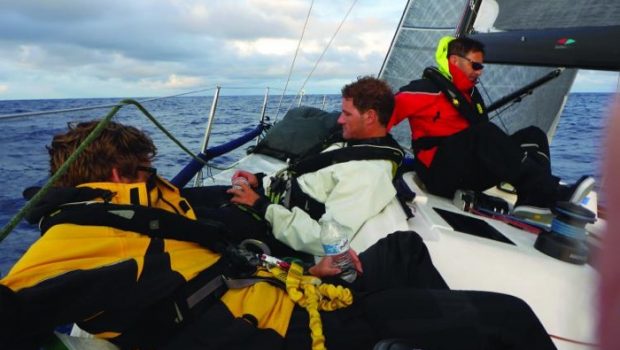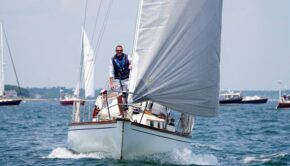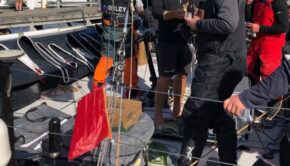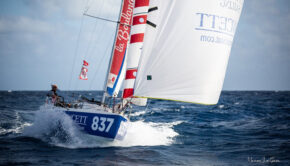Prepping for Offshore Racing
Published on May 2nd, 2019
Bob Fox’s sailing resume boasts thousands of offshore miles, most of them racing. Early on, crewing for very experienced offshore skippers was a good way to learn and build confidence and make the leap to sailing his own boat in bluewater. In SpinSheet, he shares his knowledge on expecting the unexpected, smart spending on boat prep, and staying calm in heavy weather.
Crew Is Crucial
Offshore sailing always brings the unexpected. A competent, cordial crew goes a long way to handling the inevitable dicey moments. When a harsh wind kicks up suddenly or seasickness rears its ugly head, trust counts. Conversely, if the doldrums set in, a group that’s willing to make the best of the situation will keep everyone’s spirits up.
Though Fox has taken home his fair share of silver from offshore racing, when it comes to choosing crew, he says his first priorities, after safety, have always been for everyone aboard to get along and have a good time. “I’ve found that if the crew are good friends, don’t take ourselves too seriously, communicate well, and we’re having fun, that will lead to doing well.
Winning is fun, but not when everyone is irritated with each other.” And Fox’s crew has fun together. While becalmed during the 2018 Annapolis to Bermuda Race, they did cannonballs off the side of the boat.
Compatibility is important, but an offshore crew has got to also be self-sufficient and resourceful—your lives literally depend on each other. Fox and other successful offshore leaders manage to fill their boats with groups of good people who have compatible personalities and also bring knowledge and complimentary skill sets to the boat.
“It’s also a good idea to have a few extra crew as back up,” he adds, “because once in a while someone can’t commit for one reason or another. I would also strongly recommend having aboard crew with significant offshore experience. My navigator, Greg Dupier, is a wiz. He has considerable experience and an excellent track record; he knows the technology, weather, science, math, and geometry behind sailing. Whenever Greg’s onboard, the boat does well.”
“Engineers and creative types are good to have aboard,” continues Fox, who admits that his professional background as an architect probably helps, too. “It is all about creative thinking and problem solving, which helps when the unexpected occurs.”
Feeding the crew with food that is filling, nutritious, and easy to handle is one key to a pleasant offshore experience. A competent sailor who can bring some culinary skills to the boat will always be a sought-after crewmember. Never underestimate the importance of feeding your crew well.
A Well-Prepared Boat
The transition from inland coastal cruising to offshore passage making isn’t for the faint of heart. The leap usually requires additional equipment not needed for Bay cruising or daytime racing. Racing requires the boat meet a long list of safety requirements, including a life raft, alternate steering, AIS, updated electronics, man overboard module, the ditch bag, harnesses, jacklines and clips, and the list goes on. – Full Story.









 We’ll keep your information safe.
We’ll keep your information safe.